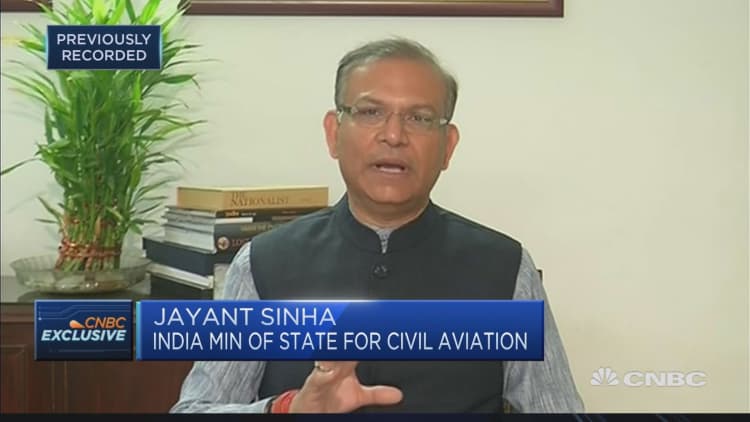
The worst is over for India's public sector banks, which have struggled in recent years with large levels of bad debt that have hamstrung their growth, according Jayant Sinha, the country's minister of state for civil aviation.
India has massively reformed its public sector banks over the last five years, he told CNBC's "Street Signs" on Friday.
"We were very, very seized with that matter and we started to put in place a very important reform package, which, in fact, has moved forward quite aggressively over the last few years," Sinha said.
Public-sector financial institutions control about 70 percent of all banking assets in India and they have had the highest exposure to soured loans.
Banks are a key source of funding for Indian companies and as their levels of bad debt grew, their lending capabilities were reduced.
To tackle the problem, the government and the country's central bank introduced a series of measures to clean up the struggling lenders.
Those included asset quality reviews to make sure all of the bad debt was declared, recapitalizing the public-sector banks, consolidating smaller banks and introducing reforms for many of their lending practices. A new bankruptcy law also helped to give the government a better handle on the way banks dealt with defaulters.
The situation has shown signs of improvements through recent earnings reports for banks as well as resolutions happening under India's insolvency and bankruptcy act. The central bank predicted that the ratio of gross non-performing assets at the lenders may decline further.
"We can conclusively say that the worst is behind us," Sinha said. "Overall, when you look at it ... you'll see that the entire nature of commercial banking in India has changed."
Airline troubles
While there might be signs of progress for India's struggling government-owned banks, troubles are emerging in the country's airlines sector.
Local carrier Jet Airways has been cash-strapped and grounded about 28 planes for not being able to pay its dues, reports said.
Previously, Kingfisher Airlines struggled with cash flow problems despite having a sizable chunk of the domestic air travel market and ultimately closed down in 2012. Its chairman, Vijay Mallya, fled the country to avoid paying outstanding debt and accumulated interest. Meanwhile, the government has struggled to find a buyer for its stake in national carrier Air India, which is also saddled with debt.
Last year, India said it was working on a relief package for the airline industry to help carriers deal with mounting losses, according to Reuters.
Sinha said Jet Airways was struggling against the low-cost carriers, while Air India, excluding its outstanding debt, was doing "very well."
"You really have to look at the business models of the different airlines to understand which airlines are going to do well in a fast-growing domestic market like India," he said, adding that the country is also building out airports at an "unprecedented rate."
Election date 'imminent'
An important event in India that is on every investor's mind is the upcoming parliamentary election, which has to take place before May.
While the government has not yet announced a date for the polls, Sinha said, "It's imminent that we will have the election schedule coming out and I think it will follow very much the same calendar that we followed last time in 2014."
— Reuters contributed to this report.


